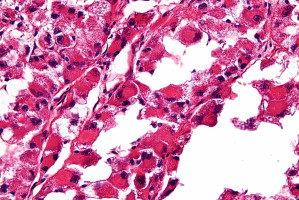
Janssen Research & Development, LLC (Janssen) have announced data from the Phase 3 multicentre study SAR3007, which demonstrated a significant improvement in progression-free survival (PFS) with trabectedin (Yondelis) compared to dacarbazine in patients with advanced liposarcoma (LPS) or leiomyosarcoma (LMS) previously treated with an anthracycline and at least one additional chemotherapy regimen.
SAR3007 is the largest randomised Phase 3 study ever conducted in this patient population.
These data were presented in an oral presentation at the American Society of Clinical Oncology (ASCO) Annual Meeting in Chicago, IL.
Soft tissue sarcoma (STS) is a type of cancer originating in the soft tissues that connect, support and surround other body structures, such as muscle, fat, blood vessels, nerves, tendons and the lining of joints.
LPS and LMS are among the most common types of STS in adults and represent approximately 40-50% of all STS cases.
“Advanced soft tissue sarcomas represent a complex set of rare diseases which, when advanced, are life threatening. Our patients need new treatment options that are effective and reasonably well tolerated, as the treatment landscape has been relatively stagnant for decades,” said George Demetri, M.D., Director, Center for Sarcoma and Bone Oncology at the Dana-Farber Cancer Institute and Professor at Harvard Medical School.
“In soft tissue sarcomas, disease stabilisation is an important metric for evaluating treatment success in patients with advanced disease. The safety data from this trial were consistent with the well-defined adverse events observed in previous clinical trials of trabectedin and in clinical use outside the United States where trabectedin has been approved to treat these aggressive diseases.”
Trabectedin is approved in 77 countries in North America, Europe, South America and Asia under the trade name Yondelis for the treatment of advanced STS as a single agent.
Janssen submitted a New Drug Application for trabectedin into the US Food and Drug Administration on November 24, 2014, which was granted Priority Review on February 3, 2015.
In this randomised, active-controlled Phase 3 study in patients with advanced LPS or LMS, trabectedin significantly reduced the risk of disease progression or death by 45% compared with those who received dacarbazine (hazard ratio [HR] = 0.550; P< 0.0001; median [M] 4.2 vs. 1.5 months, respectively), with results validated through an audit by independent radiologists.
The improved PFS benefit with trabectedin treatment was consistently observed across all clinically relevant subgroups and was further supported by an increased objective response rate (ORR), a longer duration of response (DOR), and a higher clinical benefit response rate as compared to dacarbazine.
At the interim analysis for overall survival (OS), the trial had not met the primary endpoint of OS.
The study is ongoing to determine the final OS results, which will be presented at a future meeting.
The results for the secondary efficacy endpoints are mature.
Safety findings were consistent with the well-characterised safety profiles of both agents, with the most common Grade 3-4 toxicities in the trabectedin versus the dacarbazine groups being decreased absolute neutrophil count (40% vs. 25%), decreased platelets (19% vs. 20%), and transient increases in liver transaminases, including alanine transaminase (ALT) (29% vs. 1%).
Drug-related deaths occurred in 2.1% of patients in the trabectedin group versus 0% of patients in the dacarbazine group.
Source: Janssen
We are an independent charity and are not backed by a large company or society. We raise every penny ourselves to improve the standards of cancer care through education. You can help us continue our work to address inequalities in cancer care by making a donation.
Any donation, however small, contributes directly towards the costs of creating and sharing free oncology education.
Together we can get better outcomes for patients by tackling global inequalities in access to the results of cancer research.
Thank you for your support.